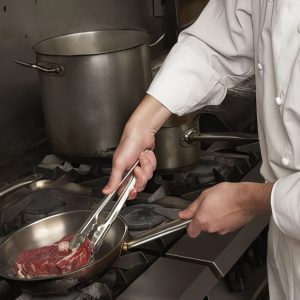Just How Important Is A Culinary Education
A culinary education is crucial for aspiring chefs and food industry professionals because it provides a solid foundation in essential skills, techniques, and knowledge necessary for success. While passion and creativity are essential in the kitchen, a formal education ensures that individuals master the fundamental cooking principles, such as knife skills, flavor profiles, and food safety.
Culinary programs also teach students about global cuisines, nutrition, and the science behind food preparation, expanding their culinary repertoire and deepening their understanding of how ingredients interact.
Beyond technical skills, a culinary education instills discipline, organization, and the ability to work efficiently under pressure—invaluable traits in a fast-paced kitchen environment. It also offers networking opportunities with industry professionals and mentors, opening doors to internships, apprenticeships, and future employment.
In a competitive industry, having a culinary degree can give candidates a distinct advantage, showcasing their commitment to their craft and readiness to take on leadership roles.
Ultimately, culinary education shapes proficient cooks and fosters creativity, innovation, and professionalism. It prepares individuals to thrive in diverse culinary settings, from fine-dining restaurants to food entrepreneurship. It equips them with the knowledge and confidence to turn their culinary passion into a successful career.
Benefits of a Culinary Education
Here are some key benefits of a culinary school education:
1. Skill Development
- Culinary school provides hands-on training in essential cooking techniques, from knife skills to advanced culinary methods. Students practice under experienced chefs’ guidance, helping them develop precision and mastery.
2. Exposure to Different Cuisines
- Students are introduced to various cuisines, broadening their culinary knowledge. This exposure helps aspiring chefs become versatile in the kitchen and capable of creating diverse dishes.
3. Professional Networking
- Culinary school offers opportunities to connect with industry professionals, including chefs, restaurant owners, and food industry experts. These connections can be valuable for career advancement and job opportunities.
4. Industry Knowledge
- Beyond cooking, culinary schools teach students about the business side of the food industry, including restaurant management, food cost analysis, menu planning, and food safety regulations.
5. Credibility and Credentials
- A culinary degree adds credibility to a chef’s resume, demonstrating formal education and dedication to the craft. This can be advantageous when applying for competitive positions or starting a food business.
6. Creative Freedom
- Students learn to follow recipes, innovate, and experiment with flavors, presentations, and culinary techniques. This creative freedom allows them to develop their culinary style.
7. Access to State-of-the-Art Equipment
- Culinary schools are often equipped with professional-grade kitchens and tools, allowing students to train with equipment they might encounter in high-end restaurants.
8. Structured Learning Environment
- Culinary schools provide a structured environment for learning, with an explicit curriculum designed to build skills progressively. This structure ensures that students cover all the necessary areas of culinary arts.
9. Confidence Building
- Through rigorous training and regular practice, culinary school graduates often leave with high confidence in their abilities to succeed in a professional kitchen.
10. Career Advancement
- Many culinary schools offer internship or apprenticeship opportunities, providing students practical experience in real kitchens. These experiences can help accelerate career growth and open doors to positions at reputable establishments.
Would you like to use this information to create content, or would you like further details on any of these benefits?












